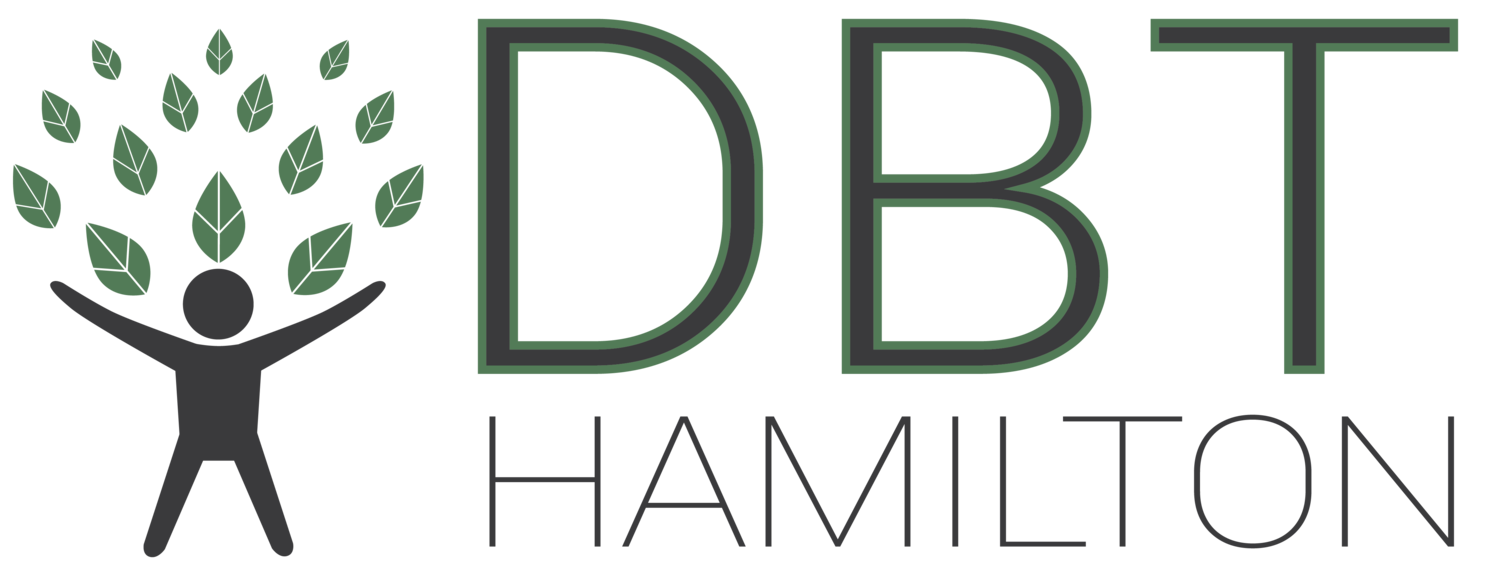
Who We Are
Our team has a wealth of experience working with individuals who experience emotion dysregulation or who are diagnosed with Borderline Personality Disorder (BPD), PTSD, Complex PTSD, and related problems. Individuals with emotion dysregulation experience intense and unpredictable emotions that can overwhelm them and make day-to-day life challenging and painful. Individuals with a BPD diagnosis commonly have difficulties with unpredictable and intense emotions, impulsive and risky behaviours (such as suicide, self-injurious behaviours, substance abuse, etc.), thoughts that become extreme when emotions are high, stormy relationships, and intense fear and difficulty coping when alone, and feelings of emptiness, and difficulties knowing who they are and what they want from life.
Dr. Lisa Burckell, Ph.D., C.Psych. established DBT Hamilton in 2017 to address issues with access to DBT. Although there are effective treatments available for emotion regulation, BPD, PTSD, Complex PTSD, and related issues many individuals cannot access treatment as quickly or as easily as they would like. We created this practice to meet this need to provide effective and compassionate care.
We are committed to helping our clients and their families make true growth and change in all areas of their lives. We also strive to provide state-of-the art evidence-based treatment accomplished by a commitment to on-going professional development, including certification by the DBT®-Linehan Board of Certification. We also provide on-going professional development to the community and to learners to expand the number of professionals who are skilled in working with people who experience emotion dysregulation.
Our Approach
A Commitment to Promote Compassionate Change
We have experience and specialized training to treat problems individuals with Borderline Personality Disorder (BPD) or intense and unpredictable emotions experience, including Dialectical Behaviour Therapy (DBT), Cognitive Processing Therapy (CPT), DBT-PTSD for Complex PTSD, and cognitive and behavioural therapy. We also have training in compassion-based treatments that focus on developing compassion, emotional resilience, decreasing shame, and mindfulness, with the goal of living life more fully.
Dialectical Behaviour Therapy (DBT)
For individuals who experience emotion dysregulation or who have been diagnosed with Borderline Personality Disorder, we provide Dialectical Behaviour Therapy (DBT). DBT was designed by Dr. Marsha Linehan to target the specific issues that cause distress for these individuals, and DBT teaches clients skills to cope in new ways rather than relying on self-injury, suicide, or other problem behaviours. DBT combines a focus on change through the use of cognitive and behavioral therapy and skills training, and acceptance through the use of validation and mindfulness strategies.
DBT has the most evidence (relative to other treatments) supporting its use for helping people who experience intense, unpredictable emotions and Borderline Personality Disorder (BPD), as well as related problems such as impulsive behaviours (e.g., substance use, etc.), suicidal behaviours, relationship issues.
There is a demand for DBT, so many clinicians want to say that they provide DBT. Unfortunately, while many of these individuals and programs claim that they provide DBT or “Do DBT”, most only provide some components of DBT, which is not DBT. For a program to say that it is providing DBT, it needs to provide the following:
1. Individual DBT therapy
2. DBT group skills training
3. In-between session coaching (e.g., phone calls, texts, etc.) to help clients apply skills in their “real” lives
4. Weekly consultation team for the therapists
The majority of the research supporting DBT is based on offering DBT that includes these 4 components. Although just attending a DBT Skills Group or seeing an individual therapist can be helpful for some people and some issues, there is limited research about how much these adaptations of DBT actually help people with a diagnosis of BPD, who are suicidal and/or self-injure, and/or those who have many previous unsuccessful attempts with therapy.
Post-traumatic Stress Disorder (PTSD)
For individuals who have experienced one or more previous traumatic experiences, who are haunted by those memories, and whose lives have been greatly affected by these experiences, there are several effective treatments to address PTSD – Cognitive Processing Therapy (CPT), Prolonged Exposure (PE), and DBT-PTSD for Complex PTSD. We provide both these treatments at DBT Hamilton.
Who We Treat
Our team works with adults (17 and older) who experience intense and unpredictable emotions (i.e., emotion dysregulation) that affect every aspect of their lives – how they behave, how they think and see themselves and the world around them, and their relationships. The people we treat commonly have problems in the following areas:
Difficulties regulating emotions and Borderline Personality Disorder
Suicidal behaviors, including suicide and self-injury
Impulsive behaviours (e.g., substance abuse, risky sexual behaviours, shoplifting, etc.)
Intense emotions (e.g., shame, sadness, fear, anger, etc.)
Difficulty building and maintaining healthy relationships
Chronic feelings of emptiness
High levels of self-hatred and shame
Post-traumatic Stress Disorder or the continuing effects of past traumatic experiences
Complex PTSD or the continuing impact of traumatic experiences that occurred during childhood and adolescence
People often come to us when other treatments have not worked and when their lives are filled with chaos and misery.
What About Other Concerns?
Many people who experience intense and unpredictable emotions or who have been diagnosed with BPD or PTSD commonly experience problems with their mood, anxiety, substance abuse, disordered eating, intense self-hatred, etc. As long as these issues are not so severe that they require specialty inpatient treatment, we treat these issues as part of DBT once any suicidal or self-injurious behaviours have stabilized. We use evidence-based cognitive and behavioural and compassion-based treatments to address these problems.
However, our focus is on helping clients with BPD, emotion dysregulation, and PTSD. If an individual’s main issue is one of these other issues (e.g., OCD, depression, etc.), we may recommend accessing treatment from the numerous publicly-funded or private specialty clinics. This is to ensure that we remain focused on our goal of providing greater access treatment for individuals with emotion dysregulation, BPD, PTSD, and related issues.

